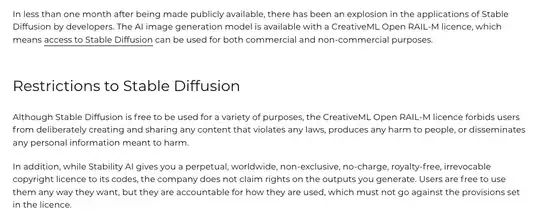The new work would not be protected by copyright law in the US. A different concern would be whether a created image might leave you liable in a copyright-infringement lawsuit. Although the output might be unique in that it algorithmically mashes two protected images into a new image, you might get sued for copying those underlying works. The input might just be text, not an image file, but that text is used by the program to search for relevant images, then copies the files (without permission). A person who unleashes a content-copying program on the internet is not immunized from an infringement lawsuit because "it wasn't me, it was my program". This is an issue that is being addressed in the courts right now (see this complaint).
On the other hand, if an image is created in a different manner, analogous to how you might verbally describe a desired image to a human artist, then there is literally no copying, and probably no legal infringement. I say "probably no infringement" because the output could end up resembling a protected work, so even if there was no actual copying, there could be legal infringement when the result is "strikingly similar" to a protected work.
